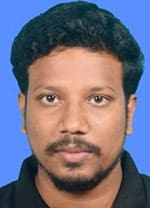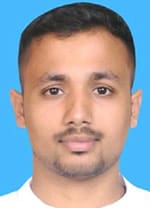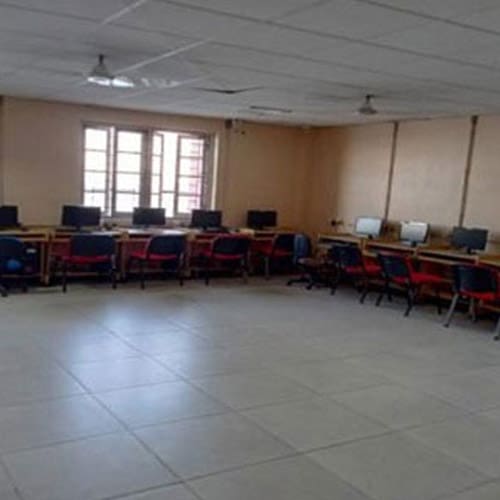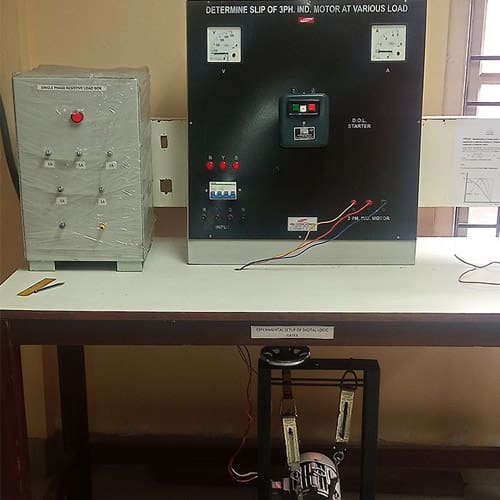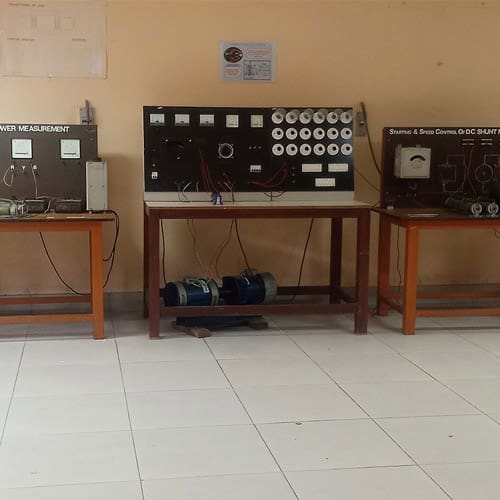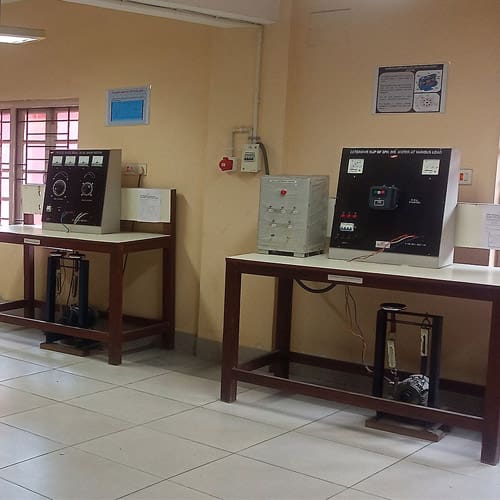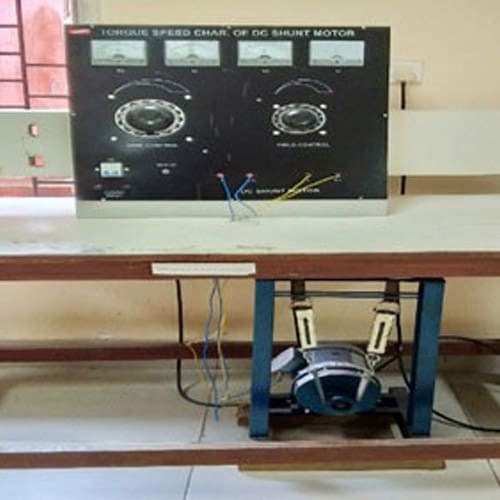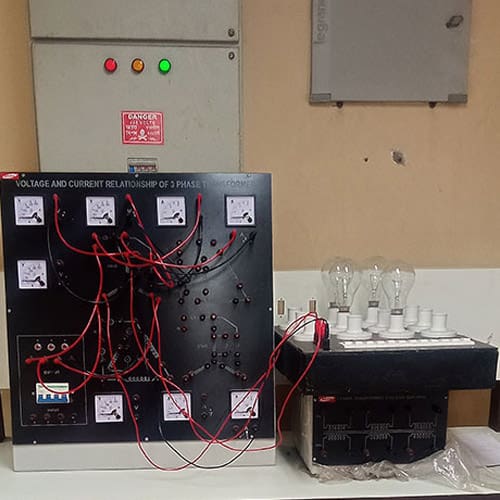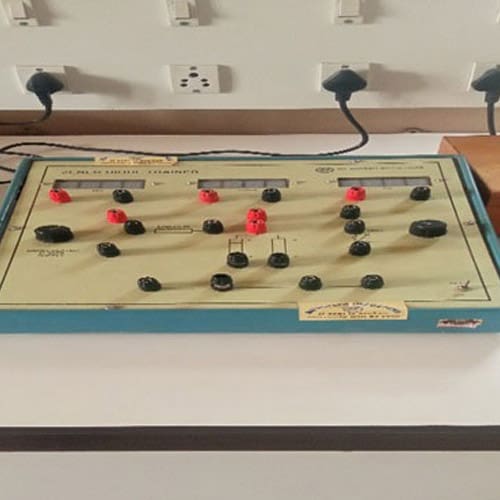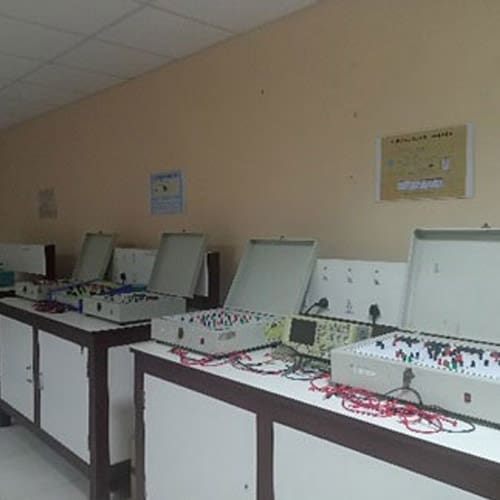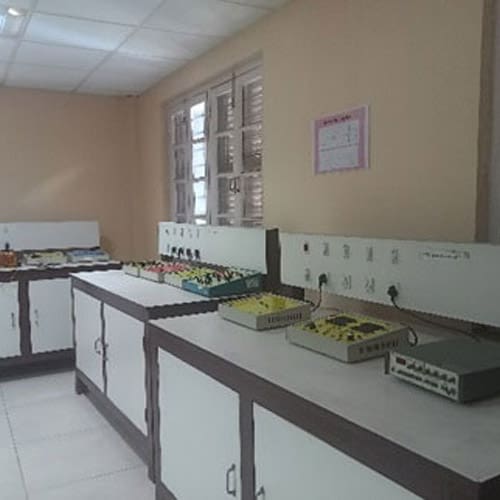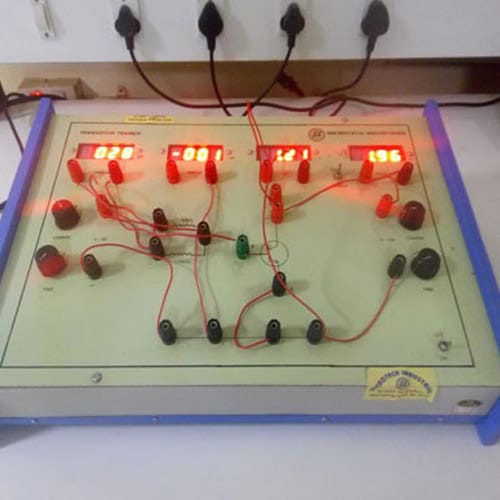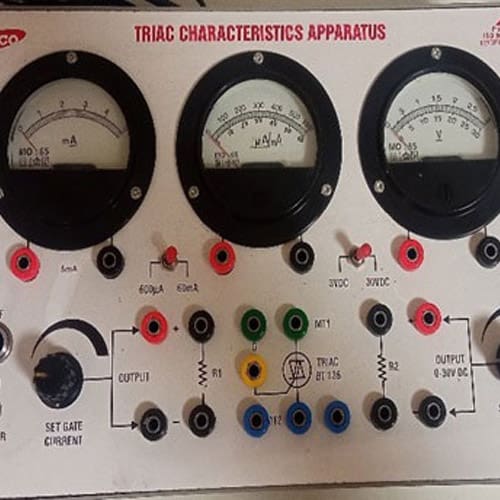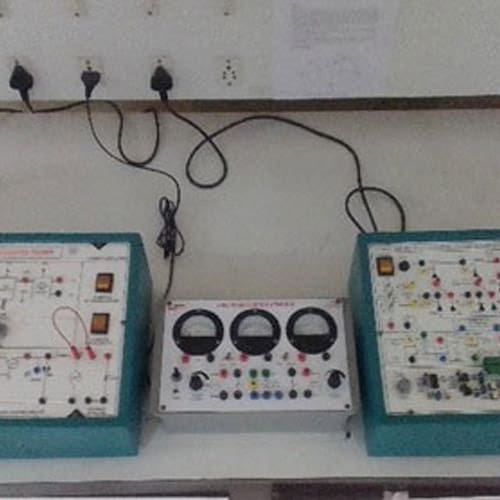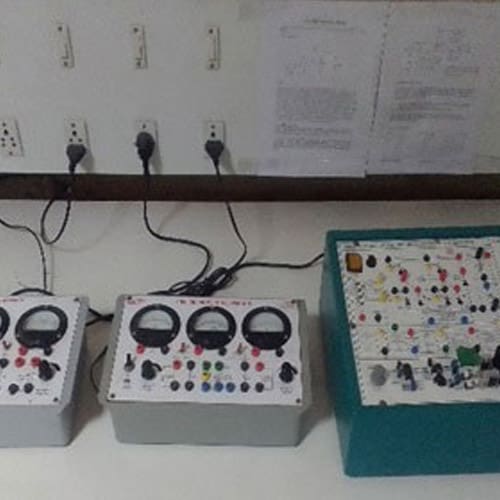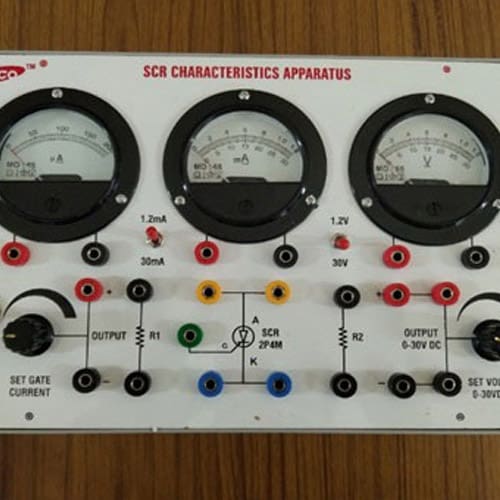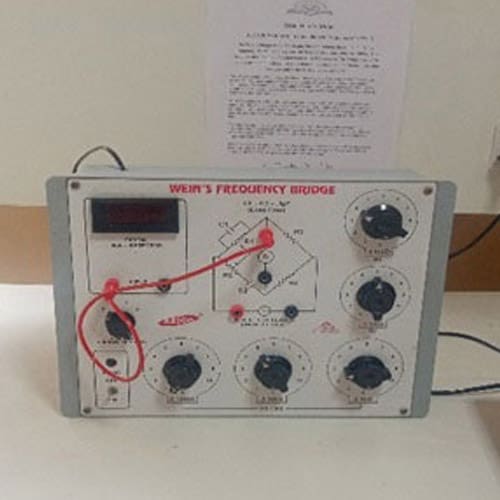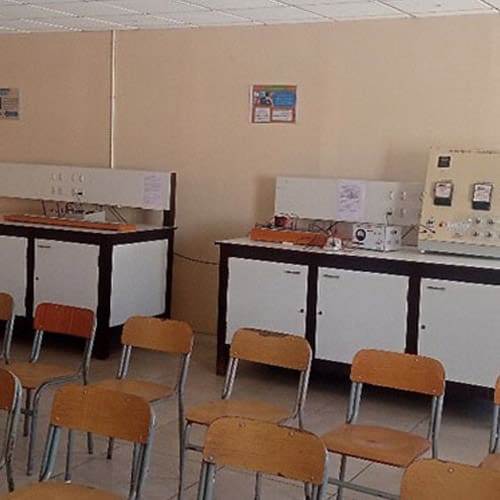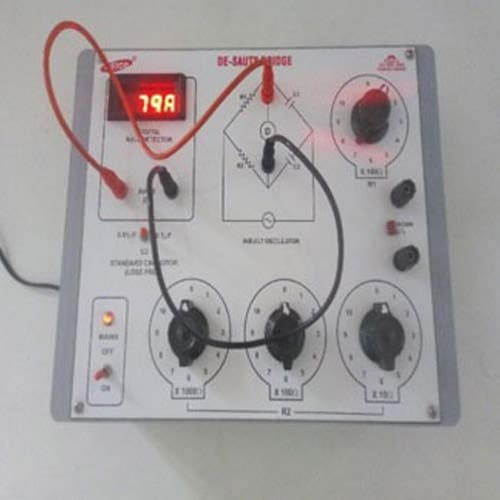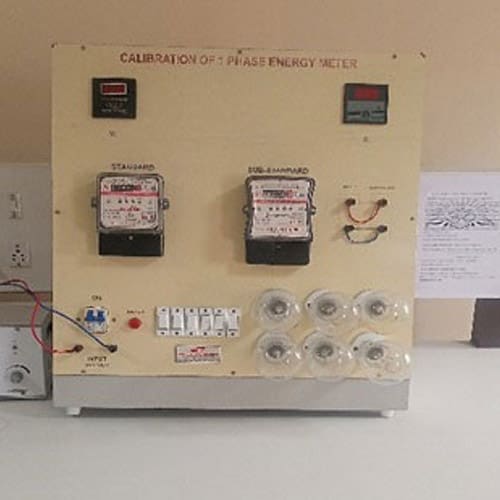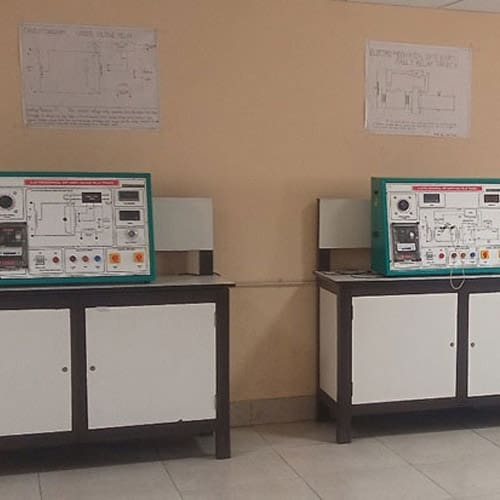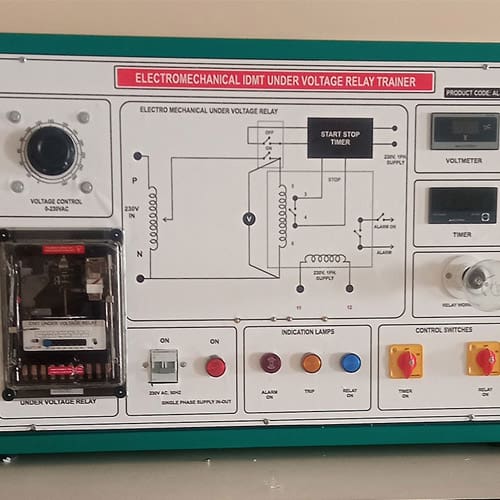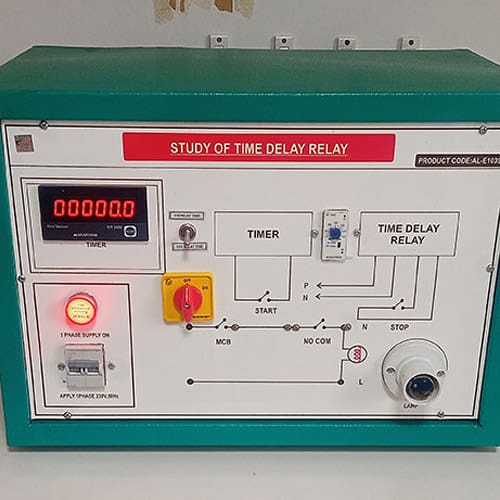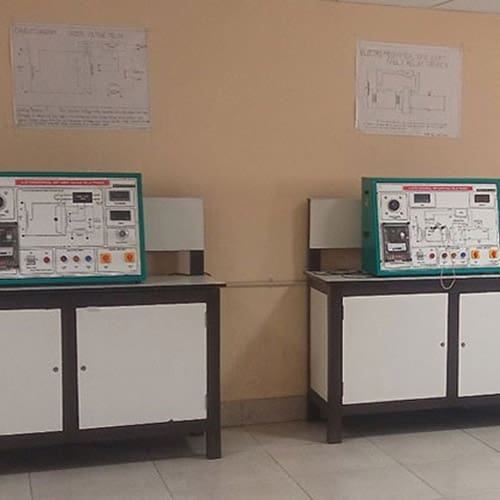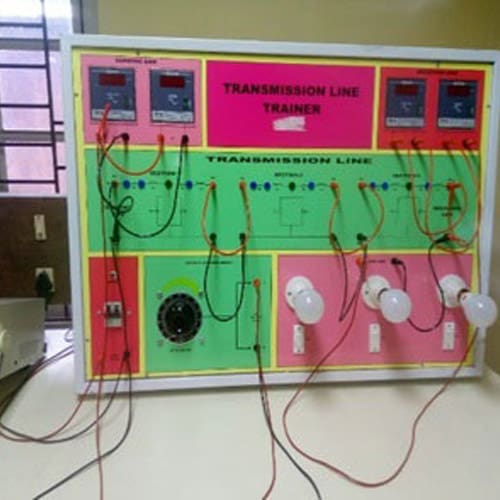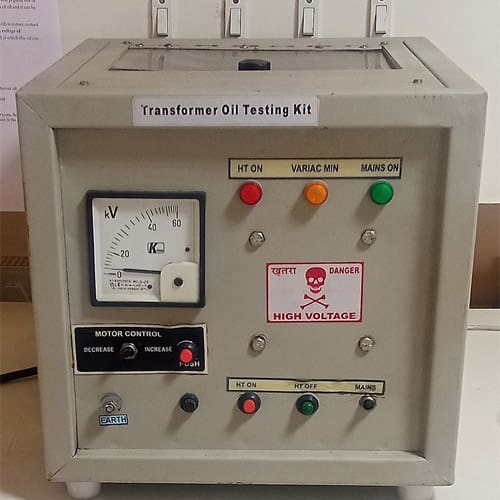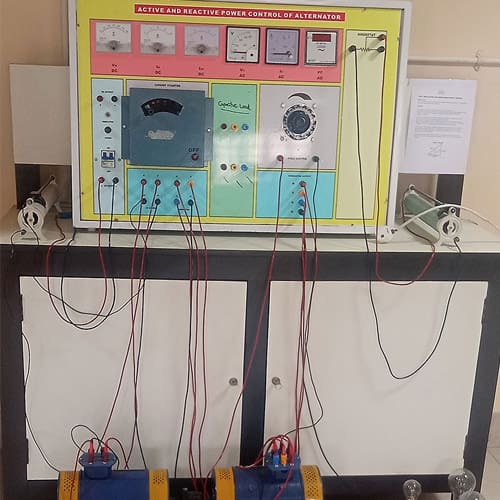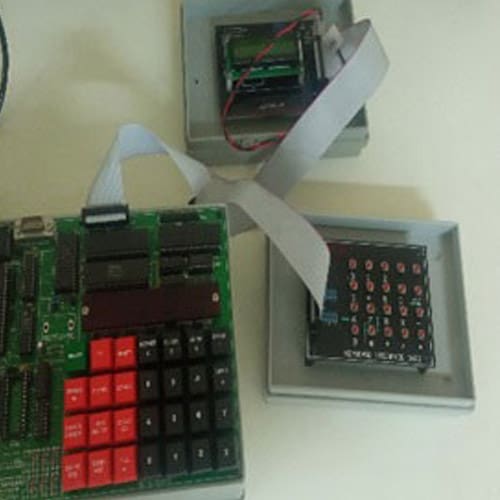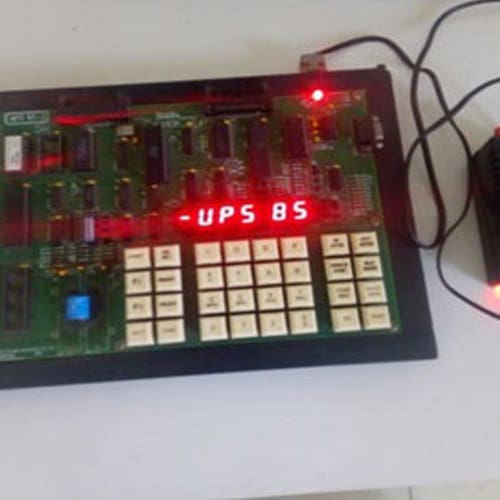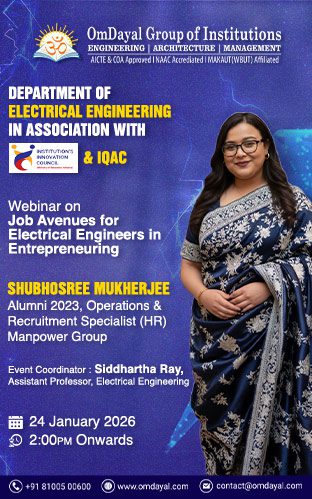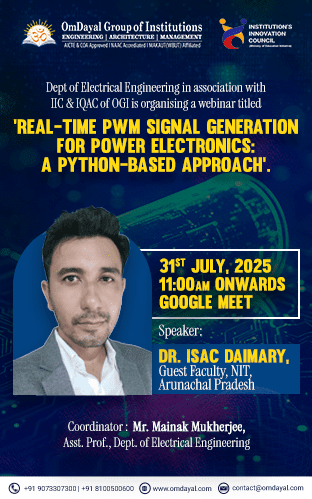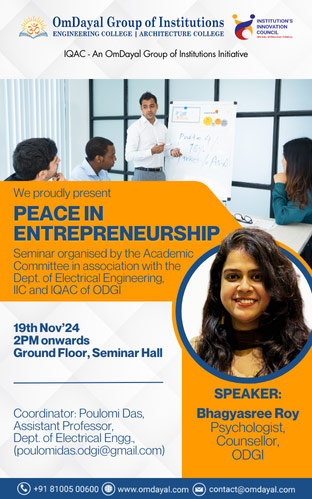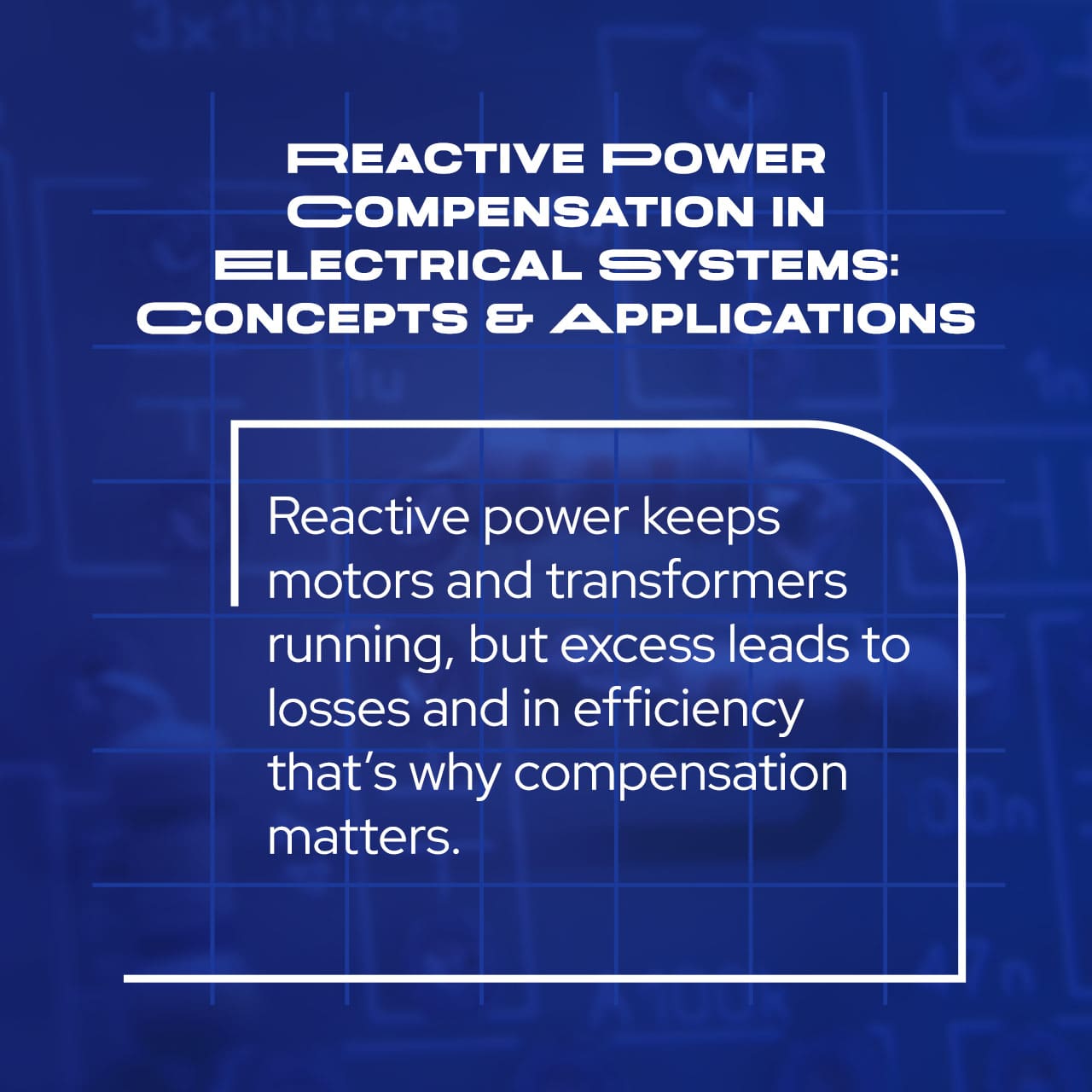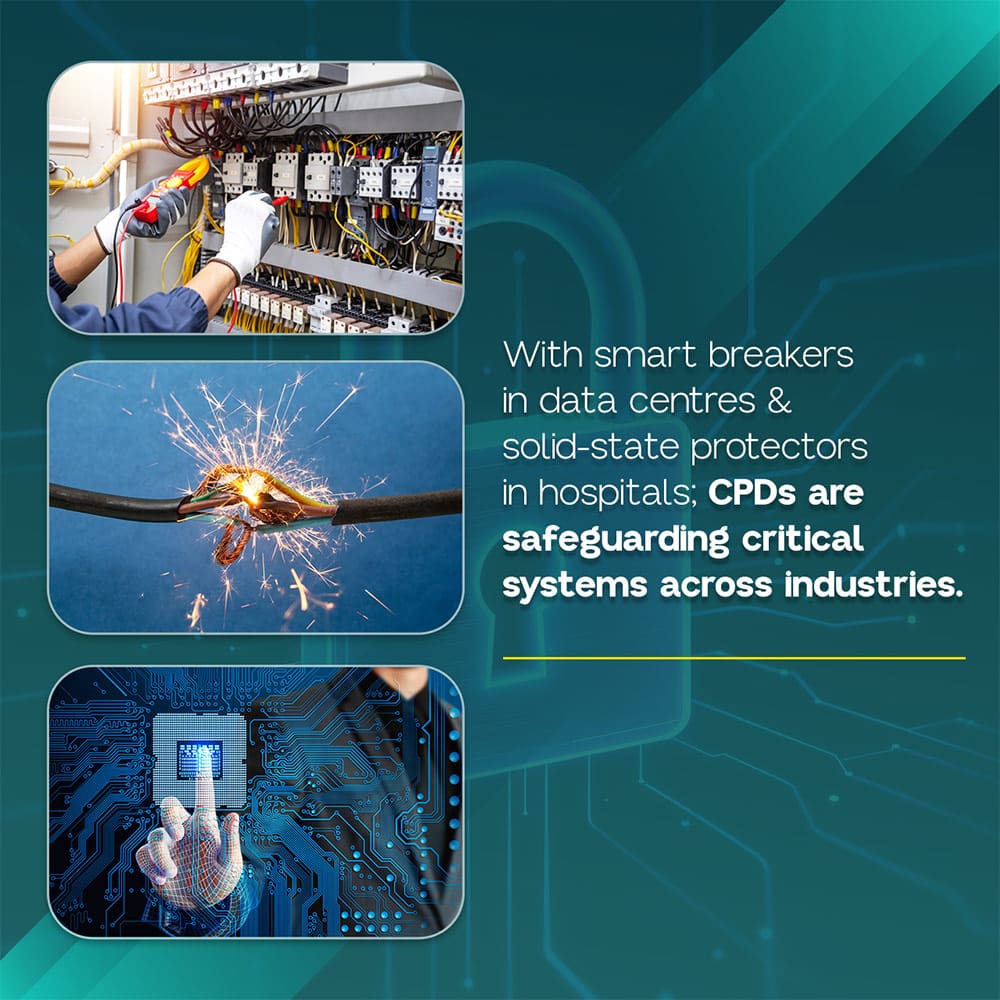Electrical Engineering
Electrical engineering is one of the most expansive and vital branches of engineering, encompassing a variety of sub-disciplines and impacting nearly every aspect of modern life.
The Department of Electrical Engineering was established in the year 2018 with a vision to enkindle young minds in the field of Electrical Engineering. In this short span of time the department has started putting its sound footing in the minds of electrical engineering students. The Electrical Engineering being one of the core branches is dominating and will continue to dominate in the job market. Many consider electricity as the single most important parameter for the development of our society. It thus tells us the story of ceaseless job opportunities.
The department is serious about well being of our students in terms of quality technical knowledge and holistic attitude. It not only provides state of the art lab what MAKAUT prescribes but also what industry needs. The department is keen on conducting industrial visits, seminars, workshops, short term courses etc. for benefit of students. It boasts of dynamic, young and experience faculties in order to attain academic excellence. The department has intake of 60 students and offers B. Tech degree in Electrical Engineering duly approved by AICTE. The department is sincere and committed to make students ready for industry.
Electrical engineers usually work with large-scale electrical industries. Throughout their careers, they work on a diverse range of technologies. After attaining the required academic qualification, there are an abundance of electrical engineering job profiles available for them on the basis of their knowledge and interests. An electrical engineer is responsible for designing and developing new electrical systems, test equipment and finds solutions to electrical problems and devices. These engineers work on multiple projects in their careers. Electrical engineers can find a number of employment opportunities in various different sectors as given below-
Different Fields pertaining to Electrical Engineers:
- Design and Development
- Manufacturing
- Engineering Research
- Maintenance & Repair
Popular Job Profiles of Electrical Engineers:
- Electrical Design Engineers
- Electrical Maintenance Engineers
- Power Plant Engineers
- Instrumentation Engineers
- Project Manager
Employment Opportunities of Electrical Engineers:
- Electric Vehicle Companies like Hero Electric Vehicles Pvt. Ltd., Bajaj Auto Limited (Bajaj Group), Ampere Vehicles Private Limited Ather Energy Pvt Ltd.
- Battery Manufacturing and Industries like Exide Industries Ltd., Eveready Industries India Ltd, Duracell Inc. Okaya Power Pvt. Ltd. Amara Raja Batteries Ltd, Su- Kam Power Systems Ltd
- Electric Power Generating Stations like Thermal, Hydel, Nuclear, Solar Power Stations etc.
- Electric Power Transmission and Distribution Companies
- Indian Engineering Services
- Indian Railways
- Indian Defence
- NTPC, BHEL, SAIL, AAI, ISRO, NTPC
- ONGC, Indian Oil etc.
- Power Industries
- Oil Refineries
- Lighting Industries
- Renewable Energy
- Regional Logistics in-Charge
- Battery Service engineer
- Software Developer
- Web Developer
- Android App Developer
- Machine Learning Engineer
Higher Studies and Research Opportunities
A student with a B. Tech degree in Electrical Engineering can opt for higher studies in M. Tech., MBA etc. from prestigious academic institutions in India and abroad. For this, one has to qualify the entrance examinations like GATE, PGET, CAT, GRE etc. After completing M.Tech degree one can go for research programs and pursue career in Academics and become Professors and Lecturers in Universities and Colleges.
Our Success Story
-
 Suvabrata Dolui Alumni: 2025 Course: B.Tech in E.E. Supervisor in Yajur Fibres Limited
Suvabrata Dolui Alumni: 2025 Course: B.Tech in E.E. Supervisor in Yajur Fibres Limited -
 Nayan Barik Alumni: 2025 Course: B.Tech in E.E. Supervisor in Combined Enterprises
Nayan Barik Alumni: 2025 Course: B.Tech in E.E. Supervisor in Combined Enterprises -
 Debnath Koley Alumni: 2024 Course: Electrical Engineering Site Engineer in L&T Construction
Debnath Koley Alumni: 2024 Course: Electrical Engineering Site Engineer in L&T Construction
Infrastructure
Basic Electrical Engineering Laboratory
Basic electrical lab makes familiarization of basic electrical equipments like motors, generators and various meters and instruments used in electrical engineering. It is needless to mention that this lab forms the plinth for understanding and acquiring advanced knowledge of electrical engineering.
Electric Circuit Theory Laboratory
This lab teaches students to determine transient response of different electrical circuit, parameters of two port network and to find frequency response of filters, Laplace transform and inverse Laplace transform. Students are familiarizing with the generation of both discrete and continuous time signals, verify network theorems and to simulate electrical circuit experiments using software.
Analog Electronics Laboratory
This lab teaches students to analyse the characteristics of full wave rectifier with filter and without filter, characteristics of BJT and FET, characteristics of Zener diode as voltage regulator, characteristics of class A, C and push pull amplifiers and to verify function of DAC and ADC, to construct function generator using IC.
Electric Machine Lab-I
In this lab students need to identify and test appropriate instruments and electrical equipments, to construct circuits with appropriate instruments and safety precautions and to validate different characteristics of DC machine, methods of speed control of DC motor and parallel operation of the transformer.
Digital Electronics Laboratory
This lab teaches students to identify appropriate equipment and instruments for the experiment, to test the instruments for application to the experiment, to construct decoder , multiplexer, adder and subtractor circuits with appropriate instruments to realize RS-JK and D flip flop, universal register with gates, multiplexer and flip-flops and asynchronous and synchronous up down counters and to validate the operation of code conversion circuit –BCD to Excess 3 & vice versa, 4 bit parity generator & comparator circuits.
Electrical & Electronics Measurement Laboratory
This lab teaches students to evaluate and adjust the precision and accuracy of AC energy meter, moving iron and dynamometer type ammeter, voltmeter and wattmeter by potentiometer to measure voltage, current, power, energy, phase, frequency, resistance, inductance, capacitance.
Electric Machine-Ii Laboratory
This lab deals with in depth experimental analysis of electrical machines. Students study characteristics of single phase & three phase induction motor, methods of speed control of induction motors, operation of synchronous generators and many other things.
Power System-I Laboratory
This lab deals with determination of earth resistance, dielectric strength of insulating oil, breakdown strength of solid insulating material, dielectric constant of transformer oil and analysis an electrical transmission line circuit.
Control System Laboratory
This lab deals with determination of control system specifications of first and second order systems and make use of MATLAB to verify theoretically calculated results of various control systems problems.
Power Electronics Laboratory
In this lab students obtain and analyse characteristics curves of SCR & Triac, study various types of electronic power converters, choppers, PWM bridge inverter and resonant converter.
Power System-Ii Laboratory
This lab validates the characteristics of under voltage relay,over current relay, earth fault relay, on load time delay relay, off load time delay relay, CT,PT. protection scheme of transformer, generator, motor and bus voltage. To apply software tools to find bus voltage, current and power flow throughout the electrical circuit.
Micro Processor And Micro Controller Laboratory
This lab teaches students to familiarize with programs in 8086 for arithmetic operations, sorting of array, searching for a number in a string & string manipulation, to interface ADC/DAC, 8255, 8251 to 8086 & LCD.
Electric Drive Laboratory
This lab teaches students how to apply different methods of control of Electric Drive in the laboratory and analyse experimental data obtained in the laboratory.
Course Information
| DURATION | 4 years |
| PROGRAMME TYPE | UG |
| COURSE APPROVED BY | AICTE |
| DEGREE AWARDED BY | MAKAUT |
Intake Capacity
- 60Seats Electrical Engineering
Semester 1
- Physics-I
- Mathematics – IB
- Basic Electrical Engineering
- Physics-I Laboratory
- Basic Electrical Engineering laboratory
- Workshop / Manufacturing Practices
Semester 2
- Chemistry-I (Gr-A)
- Mathematics –IIB
- Programming for Problem Solving
- English
- Chemistry-I Laboratory
- Programming for Problem Solving Laboratory
- Engineering Graphics & Design (Gr-A)
- Language Laboratory
Semester 3
- Electric Circuit Theory
- Analog Electronics
- Electromagnetic field Theory
- Engineering Mechanics
- Mathematics – III
- Biology for Engineers
- Indian Constitution
- Electric Circuit Theory Laboratory
- Analog Electronics Laboratory
- Numerical Methods Laboratory
- Total of Practical / Sessional
Semester 4
- Electric Machine – I
- Digital Electronics
- Thermal Power Engineering
- Values and Ethics in Profession
- Environmental Science
- Electric machines I laboratory
- Digital Electronics Laboratory
- Electrical and electrical measurement Laboratory
- Thermal Power Engineering Laboratory
- Total of Practical / Sessional
Semester 5
- Electric Machine – II
- Power System – I
- Control System
- Power Electronics
- A. High voltage Engineering
- B. Power Plant Engineering
- C. Renewable & Non-Conventional energy
- A. Data structure & Algorithm
- B. Object oriented programming
- C. Computer organization & Architecture
- Electric Machine-II laboratory
- Power system-I laboratory
- Control system laboratory
- Power Electronics Laboratory
- Total of Practical / Sessional
Semester 6
- Power System-II
- A. Digital control system
- B. HVDC transmission
- C. Electrical Machine
- A. Electrical and Hybrid vehicle
- B. Power quality & FACTS
- C. Industrial Electrical Systems
- A. Digital Signal Processing
- B. Communication Engineering
- C. VLSI & Microelectronics
- Economics for Engineers
- Power system-II laboratory
- Micro Processor & Micro Controller Laboratory
- Electrical & Electronics Design Laboratory
- Total of Practical / Sessional
Semester 7
- Electric Device
- A. Control System Design
- B. Electrical Energy Conservation & Auditing
- C. Power Generation Economics
- A. Artificial Intelligence
- B. Internet of Things
- C. Computer Graphics
- A. Embedded System
- B. Digital Image Processing
- C. Computer Network
- Principle of Management
- Electric Drive Laboratory
- Project Stage – I
- Seminar
- Total of Practical / Sessional
Semester 8
- Utilization of Electric Power
- A. Line –commutated and active PWM rectifiers
- B. Power system dynamics & control
- C. Advanced Electric Drives
- D. Industrial Automation
- A. Soft computing Techniques
- B. Biomedical Instrumentation.
- C. Introduction to Machine learning
- D. Sensors and Transducers
- Project-III
- Total of Practical / Sessional
-
Mr. Swapan Kumar Majumder
Designation : Assistant Professor Experience : 35 Years -
Dr. Arup Sinha
Designation : Professor Experience : 30 Years -
Dr. Poulomi Das
Designation : Assistant Professor Experience : 13.5 Years -
Ms. Arpita Gope
Designation : Assistant Professor Experience : 12 Years -
Mr. Siddhartha Ray
Designation : Assistant Professor Experience : 11 Years -
Mr. Abhishek Manna
Designation : Assistant Professor Experience : 10 Years -
Mr. Mainak Mukherjee
Designation : Assistant Professor Experience : 7 Years
Admissions
For attractive scholarship details call 90733 07300 / 81005 00600Eligibility
Eligibility Criteria 2026-27
- Valid rank in WBJEE or JEE (Main) 2024.
- 10+2 Board Exam – 45% aggregate in Physics, Mathematics along with Chemistry / Biology / Biotechnology / Computer Science / Information Technology /Information Practices / Engineering Graphics/ Business Studies. Candidates must clear Theory & Practical examination. 40% marks in case of candidates of SC/ST/OBC in the above subjects taken together.
- Passed in English
# The lower age limit is 17 (seventeen) years as on 31.12.2024
# No upper age limit.
Admission Procedure
Academic Session 2026-27
The candidate can take admission via WBJEEB Counselling process or can come to college directly for admission.
For WBJEEB Counselling:
- After publication the counseling notification of WBJEE, students have to register for e-counseling process, to the portal of West Bengal Joint Entrance Examination Board (wbjeeb.nic.in).
- Students have to fill their choice of streams and as well as institute. Students will get their allotment of seat according to the choice filled.
- After getting the allotment, students need to report to the reporting centre (list given in the WBJEE portal).
- After reporting to the reporting centre, students report to the respective institute for taking admission.
- Students, who are intended to take direct admission, contact office to the institution.
Fees Structure
Fee Structure for 2026-27
| Semester* | I | II | III | IV | V | VI | VII | VIII | Total |
|---|---|---|---|---|---|---|---|---|---|
| Amount Payable | |||||||||
| Admission Fees | 5,000 | 0 | 0 | 0 | 0 | 0 | 0 | 0 | 5,000 |
| Tuition Fees | 55,000 | 55,000 | 55,000 | 55,000 | 55,000 | 55,000 | 55,000 | 55,000 | 440,000 |
| Library Fee | 750 | 750 | 750 | 750 | 750 | 750 | 750 | 750 | 6,000 |
| Students Activity | 500 | 500 | 500 | 500 | 500 | 500 | 500 | 500 | 4,000 |
| Refundable Caution Deposit | 5,000 | 0 | 0 | 0 | 0 | 0 | 0 | 0 | 5,000 |
| Total | 66,250 | 56,250 | 56,250 | 56,250 | 56,250 | 56,250 | 56,250 | 56,250 | 460,000 |
*As per No: 466-Edn-(T)/l0M -0412004 (Part IV) Date: 16.10.2023
Semester I, III, V, VII covers period July to December & Semester II, IV, VI, VIII covers period January to June.
- MAKAUT Fee (Registration, Student Development, Examination etc.) is to be paid separately, as applicable.
- Tuition Fee & other fees are subject to revision by the Fee Structure Committee, Govt. of West Bengal / MAKAUT.
- Fee (without late fine) needs to be paid semester wise, within 10th of the first month of the semester. Late payment of fees will cause payment of the late fine and such other action as may deemed appropriate by the suitable authority
- Transport Fee will be charged extra in accordance with distance travelled.
- Uniform Fee will have to be paid extra to the uniform supplier.
- Transport / Hostel Facility can be availed subject to availability


